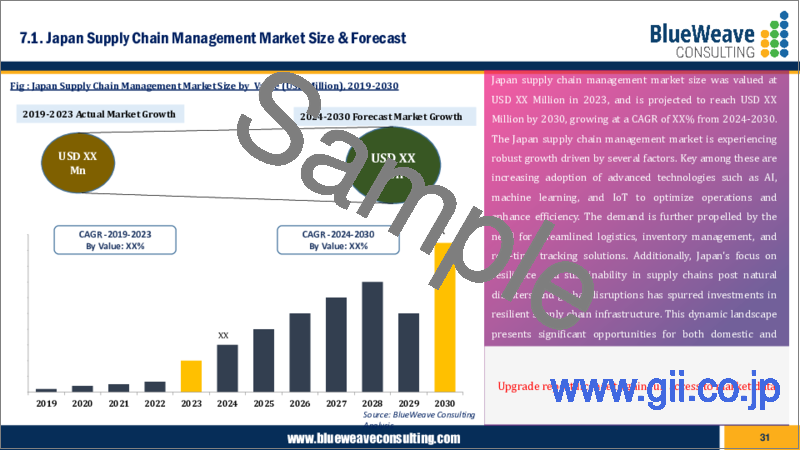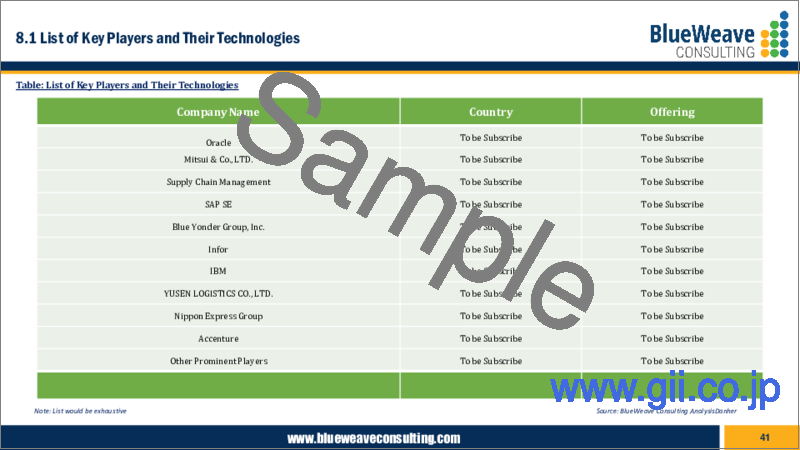|
|
市場調査レポート
商品コード
1310375
サプライチェーンマネジメント(SCM)の日本市場:動向分析、競合情勢、予測:2019年~2029年Japan Supply Chain Management Market, By Component ; By Deployment Mode ; By Organization Size (Small & Medium-sized Enterprises, Large Enterprises); By Vertical, Trend Analysis, Competitive Landscape & Forecast, 2019-2029 |
||||||
|
|||||||
| サプライチェーンマネジメント(SCM)の日本市場:動向分析、競合情勢、予測:2019年~2029年 |
|
出版日: 2023年07月03日
発行: Blueweave Consulting
ページ情報: 英文 200 Pages
納期: 2~3営業日
|
- 全表示
- 概要
- 図表
- 目次
日本のサプライチェーンマネジメント(SCM)市場規模が倍増を超え、2029年までに190億米ドルを突破
日本のサプライチェーンマネジメント(SCM)市場は、業務効率化への関心の高まり、人工知能やブロックチェーンなどの先進技術の採用、リアルタイムの可視性と透明性に対する需要の高まり、サプライチェーンにおける効果的なリスク管理と回復力の必要性などにより、急速に成長しています。
戦略コンサルティングと市場調査の大手企業であるBlueWeave Consultingは最近の調査で、日本のサプライチェーンマネジメント(SCM)市場規模を2022年に91億5,000万米ドルと推定しました。2023年から2029年にかけての予測期間中、日本のサプライチェーンマネジメント(SCM)市場規模はCAGR 11.20%で堅調に成長し、2029年には190億9,000万米ドルに達するとBlueWeaveは予測しています。自動車、エレクトロニクス、製薬などの製造業が好調な日本では、生産・配送手順の最適化に効果的なSCMソリューションが必要とされており、これが同市場の拡大を後押しする主な要因となっています。また、人工知能(AI)、モノのインターネット(IoT)、ブロックチェーンなど、サプライチェーンプロセスにおける革新的技術の利用が増加しており、可視性、トレーサビリティ、全体的な効率が向上しています。日本における独創的なSCMソリューションの需要は、コスト削減、在庫管理、持続可能性に重点を置くようになったことも背景にあります。革新的で効率的な手順を使用するよう企業に奨励することで、デジタル化と自動化を促進しようとする政府の試みは、サプライチェーンマネジメント業界の拡大にさらに拍車をかけると予想されます。
本レポートの詳細な分析により、日本のサプライチェーンマネジメント(SCM)市場の成長可能性、今後の動向、統計に関する情報を提供します。また、総市場規模の予測を促進する要因にも焦点を当てています。当レポートは、日本のサプライチェーンマネージメント(SCM)市場の最新技術動向と業界洞察を提供し、意思決定者が健全な戦略的意思決定を行うことを約束します。さらに、市場の成長促進要因・課題・競争力についても分析しています。
目次
第1章 調査の枠組み
第2章 エグゼクティブサマリー
第3章 日本のサプライチェーンマネジメント(SCM)市場に関する洞察
- 業界のバリューチェーン分析
- DROC分析
- 成長の原動力
- 中小企業におけるクラウドサプライチェーンマネジメント(SCM)の採用増加
- eコマースの台頭
- 抑制要因
- 企業間で高まるセキュリティとプライバシーの懸念
- 機会
- テクノロジーの進歩
- 課題
- サプライチェーンマネジメント(SCM)ツールに対する認識が限定的
- 成長の原動力
- 技術の進歩/最近の開発
- 規制の枠組み
- ポーターのファイブフォース分析
第4章 日本のサプライチェーンマネジメント(SCM)市場概要
- 市場規模と予測、2019~2029年
- 金額別
- 市場シェアと予測
- コンポーネント別
- ソリューション
- サービス
- 展開モード別
- オンプレミス
- クラウド
- 組織規模別
- 中小企業(SME)
- 大企業
- 業界別
- 小売とeコマース
- ヘルスケア
- 自動車
- 輸送と物流
- 食品・飲料
- 製造業
- その他
- コンポーネント別
第5章 競合情勢
- 主要企業とその製品のリスト
- 日本のサプライチェーンマネジメント企業の市場シェア分析、2022年
- 経営パラメータ別競合ベンチマーキング
- 主要な戦略的展開(合併、買収、パートナーシップなど)
第6章 日本のサプライチェーンマネジメント(SCM)市場へのCOVID-19の影響
第7章 企業プロファイル(会社概要、財務マトリックス、競合情勢、主要な人材、主要な競合、連絡先住所、戦略的展望、 SWOT分析)
- SAP SE
- Oracle
- Blue Yonder Group, Inc.
- Infor
- Manhattan Associates
- Coupa Software Inc.
- IBM
- Logility, Inc.
- Korber AG
- Epicor Software Corporation
- Other Prominent Players
第8章 主要な戦略的推奨事項
第9章 調査手法
List of Figures
- Figure 1 Japan Supply Chain Management Segmentation
- Figure 2 Japan Supply Chain Management Market Value Chain Analysis
- Figure 3 Company Market Share Analysis, 2022
- Figure 4 Japan Supply Chain Management Market Size, By Value (USD Million), 2019-2029
- Figure 5 Japan Supply Chain Management Market Share, By Component, By Value, 2019-2029
- Figure 6 Japan Supply Chain Management Market Share, By Deployment, By Value, 2019-2029
- Figure 7 Japan Supply Chain Management Market Share, By Organization Size, By Value, 2019-2029
- Figure 8 Japan Supply Chain Management Market Share, By Vertical, By Value, 2019-2029
List of Tables
- Table 1 Japan Supply Chain Management Market Size, By Value (USD Million), 2019-2029
- Table 2 Japan Supply Chain Management Market Size, By Component, By Value, 2019-2029
- Table 3 Japan Supply Chain Management Market Size, By Deployment, By Value, 2019-2029
- Table 4 Japan Supply Chain Management Market Size, By Organization Size, By Value, 2019-2029
- Table 5 Japan Supply Chain Management Market Size, By Vertical, By Value, 2019-2029
- Table 6 SAP SE Company Overview
- Table 7 SAP SE Financial Overview
- Table 8 Oracle Company Overview
- Table 9 Oracle Financial Overview
- Table 10 Blue Yonder Group, Inc. Company Overview
- Table 11 Blue Yonder Group, Inc. Financial Overview
- Table 12 Infor Company Overview
- Table 13 Infor Financial Overview
- Table 14 Manhattan Associates Company Overview
- Table 15 Manhattan Associates Financial Overview
- Table 16 Coupa Software Inc. Company Overview
- Table 17 Coupa Software Inc. Financial Overview
- Table 18 IBM Company Overview
- Table 19 IBM Financial Overview
- Table 20 Logility, Inc. Company Overview
- Table 21 Logility, Inc. Financial Overview
- Table 22 Korber AG Company Overview
- Table 23 Korber AG Financial Overview
- Table 24 Epicor Software Corporation Company Overview
- Table 25 Epicor Software Corporation Financial Overview
Japan Supply Chain Management (SCM) Market Size More Than Doubles to Cross USD 19 Billion by 2029.
Japan supply chain management (SCM) market is rapidly growing due to an increasing focus on operational efficiency, adoption of advanced technologies, such as artificial intelligence and blockchain, a spurring demand for real-time visibility and transparency, and the need for effective risk management and resilience in supply chains.
BlueWeave Consulting, a leading strategic consulting and market research firm, in its recent study, estimated Japan supply chain management (SCM) market size at USD 9.15 billion in 2022. During the forecast period between 2023 and 2029, BlueWeave expects the Japan supply chain management (SCM) market size to grow at a robust CAGR of 11.20% reaching a value of USD 19.09 billion by 2029. The robust manufacturing sector in Japan, which includes the automotive, electronics, and pharmaceutical industries and necessitates effective SCM solutions to optimize production and delivery procedures, is the main factor fueling the market's expansion in that country. Also, the increasing use of innovative technology in supply chain processes, including artificial intelligence (AI), the Internet of Things (IoT), and blockchain, improves visibility, traceability, and overall efficiency. The demand for creative SCM solutions in Japan is also driven by the country's growing emphasis on cost-cutting, inventory control, and sustainability. By encouraging businesses to use innovative and efficient procedures, the government's attempts to promote digitalization and automation are expected to further fuel the expansion of the supply chain management industry.
Japan Supply Chain Management (SCM) Market - Overview:
The production, acquisition, transformation, and distribution of commodities and services are all strategically coordinated and integrated through supply chain management. It includes all facets of a business's operations, including planning, sourcing, production, logistics, and customer support. SCM seeks to maximize the movement of resources, data, and money along the whole supply chain network, from suppliers to end users. A successful SCM strategy guarantees prompt product delivery, reduces expenses, increases customer happiness, and improves overall company performance. It entails working together, coordinating, and utilizing technology to simplify procedures and boost productivity throughout the supply chain.
Impact of COVID-19 on Japan Supply Chain Management (SCM) Market:
The COVID-19 pandemic significantly affected Japan's supply chain management (SCM) market, leading to widespread disruptions and challenges. The country, heavily reliant on global trade, experienced severe disruptions in transportation, logistics, and production. Lockdowns, travel restrictions, and workforce shortages created bottlenecks and delays in the supply chain, affecting various industries, such as manufacturing, retail, and e-commerce. Businesses faced difficulties in procuring raw materials, managing inventory, and meeting customer demand. The pandemic highlighted vulnerabilities in supply chain resilience, prompting companies to reassess their strategies and invest in digital solutions, remote monitoring, and agile operations. As Japan emerges from the crisis, it aims to build a more resilient and adaptable supply chain ecosystem.
Japan Supply Chain Management (SCM) Market - By Deployment Mode:
Based on deployment mode, Japan supply chain management (SCM) market is divided into On-premises and Cloud-based segments. The cloud-based segment is a larger deployment mode in Japan supply chain management (SCM) market. With the increasing demand for scalable, flexible, and cost-effective solutions, businesses in Japan are shifting toward cloud-based SCM systems. The cloud-based segment provides several advantages, including real-time visibility, data integration, collaboration, and accessibility from anywhere. Also, it enables businesses to streamline their operations, enhance efficiency, and make data-driven decisions. Thus, the cloud-based segment holds a significant market share in the Japan SCM market, reflecting its dominance in meeting the evolving needs of businesses.
Competitive Landscape:
Japan supply chain management (SCM) market is fiercely competitive. Major companies in the market include SAP SE, Oracle, Blue Yonder Group, Inc., Infor, Manhattan Associates, Coupa Software Inc., IBM, Logility, Inc., Korber AG, and Epicor Software Corporation. These companies use various strategies, including increasing investments in their R&D activities, mergers and acquisitions, joint ventures, collaborations, licensing agreements, and new product and service releases to further strengthen their position in Japan supply chain management (SCM) market.
The in-depth analysis of the report provides information about growth potential, upcoming trends, and statistics of Japan Supply Chain Management (SCM) Market. It also highlights the factors driving forecasts of total market size. The report promises to provide recent technology trends in Japan Supply Chain Management (SCM) Market and industry insights to help decision-makers make sound strategic decisions. Furthermore, the report also analyzes the growth drivers, challenges, and competitive dynamics of the market.
Table of Contents
1. Research Framework
- 1.1. Research Objective
- 1.2. Product Overview
- 1.3. Market Segmentation
2. Executive Summary
3. Japan Supply Chain Management Market Insights
- 3.1. Industry Value Chain Analysis
- 3.2. DROC Analysis
- 3.2.1. Growth Drivers
- 3.2.1.1. Increasing Adoption of Cloud Supply Chain Management Among SMEs
- 3.2.1.2. Rise of E-commerce
- 3.2.2. Restraints
- 3.2.2.1. Growing Security and Privacy Concern among Enterprises
- 3.2.3. Opportunities
- 3.2.3.1. Advancement in Technology
- 3.2.4. Challenges
- 3.2.4.1. Limited Awareness of Supply Chain Management Tools
- 3.2.1. Growth Drivers
- 3.3. Technology Advancements/Recent Developments
- 3.4. Regulatory Framework
- 3.5. Porter's Five Forces Analysis
- 3.5.1. Bargaining Power of Suppliers
- 3.5.2. Bargaining Power of Buyers
- 3.5.3. Threat of New Entrants
- 3.5.4. Threat of Substitutes
- 3.5.5. Intensity of Rivalry
4. Japan Supply Chain Management Market Overview
- 4.1. Market Size & Forecast, 2019-2029
- 4.1.1. By Value (USD Million)
- 4.2. Market Share & Forecast
- 4.2.1. By Component
- 4.2.1.1. Solution
- 4.2.1.2. Services
- 4.2.2. By Deployment Mode
- 4.2.2.1. On-premises
- 4.2.2.2. Cloud
- 4.2.3. By Organization Size
- 4.2.3.1. Small and Medium-sized Enterprises (SMEs)
- 4.2.3.2. Large Enterprises
- 4.2.4. By Vertical
- 4.2.4.1. Retail & E-commerce
- 4.2.4.2. Healthcare
- 4.2.4.3. Automotive
- 4.2.4.4. Transportation & Logistics
- 4.2.4.5. Food & Beverages
- 4.2.4.6. Manufacturing
- 4.2.4.7. Others
- 4.2.1. By Component
5. Competitive Landscape
- 5.1. List of Key Players and Their Offerings
- 5.2. Japan Supply Chain Management Company Market Share Analysis, 2022
- 5.3. Competitive Benchmarking, By Operating Parameters
- 5.4. Key Strategic Developments (Mergers, Acquisitions, Partnerships, etc.)
6. Impact of Covid-19 on Japan Supply Chain Management Market
7. Company Profile (Company Overview, Financial Matrix, Competitive Landscape, Key Personnel, Key Competitors, Contact Address, Strategic Outlook, SWOT Analysis)
- 7.1. SAP SE
- 7.2. Oracle
- 7.3. Blue Yonder Group, Inc.
- 7.4. Infor
- 7.5. Manhattan Associates
- 7.6. Coupa Software Inc.
- 7.7. IBM
- 7.8. Logility, Inc.
- 7.9. Korber AG
- 7.10. Epicor Software Corporation
- 7.11. Other Prominent Players
8. Key Strategic Recommendations
9. Research Methodology
- 9.1. Qualitative Research
- 9.1.1. Primary & Secondary Research
- 9.2. Quantitative Research
- 9.3. Market Breakdown & Data Triangulation
- 9.3.1. Secondary Research
- 9.3.2. Primary Research
- 9.4. Breakdown of Primary Research Respondents, By Region
- 9.5. Assumptions & Limitations
*Financial information of non-listed companies can be provided as per availability.
**The segmentation and the companies are subject to modifications based on in-depth secondary research for the final deliverable.





